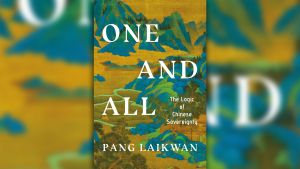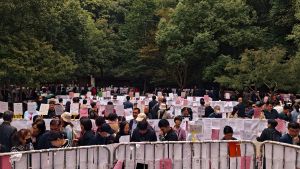
A Road to Forgetting: Friendship and Memory in China’s Belt and Road Initiative
In the midst of the mass detention of ethnic Uyghurs, Kazakhs, and Kyrgyz in the so-called ‘reeducation camps’ in China’s Xinjiang Uyghur Autonomous Region, a Sino-Kazakh coproduction based on the life of Chinese musician Xian Xinghai is close to release. The Composer portrays the friendship between Xian—the mind behind the Yellow River Cantata and On the Taihang Mountains, classic patriotic ‘red’ songs that every middle school student in China learns to sing—and a Kazakh composer named Bakhitzhan Baykadamov.
It is not the first time that the life of Xian has been depicted on the silver screen. Previous iterations include a film directed by Wang Hengli in 1994 and a TV drama directed by Duan Guoping in 2005, both of which were entitled Xian Xinghai and mostly depicted his years studying in Paris and his transformation into a ‘people’s musician’ (人民音乐家). Now that Kazakhstan is one of the most strategic partners of China’s Belt and Road Initiative (BRI), it is not surprising that The Composer focuses instead on Xian’s life in Kazakhstan. The film was originally inspired by Xi Jinping’s 2013 keynote speech at Nazarbayev University in Astana, Kazakhstan, when he launched the BRI. During this speech Xi told a touching story of Xian in distress receiving help from Baykadamov in Almaty. When Xi visited Kazakhstan again in June 2017, both sides signed a coproduction agreement setting The Composer as their first joint venture (Zhou 2018).
There has been a flowering of Sino-Kazakh ‘cultural exchanges’ in the name of national friendship over the last few years. In 2015, China erected a monument to Kazakh philosopher Abay Qunanbayev in Beijing; in 2017, the heartthrob Kazakh singer Dimash Kudaibergen won top accolades on the Chinese TV show I am a Singer, inspiring many Chinese fangirls to study the Kazakh language (Rednet 2017); and the following year, Chinese singer Lin Bao won the second-place prize with a Kazakh song at the international contest Voice of Astana in Kazakhstan. Still, while the Chinese public and media started to gain a better understanding of Kazakhstan, the fact that over one million ethnic Uyghurs and Kazakhs in Xinjiang are living in hellish conditions is met with silence in Chinese media and public discussion.
Breakup to Friendship
The relationship between China and Kazakhstan has always been dramatic. Before Kazakhstan became a part of the Soviet Union in 1936, there were numerous historical conflicts between the Chinese and Russian empires over the Kazakh border. The Soviet Union maintained interests in Xinjiang while it was allied with China throughout World War II. In the 1940s, Moscow cultivated Uyghur nationalism, aligned with Soviet interests, but eventually terminated its support in the wake of the foundation of the People’s Republic of China (PRC) (Brophy 2016, 166–247). In its early years, the PRC enjoyed a brief honeymoon with the Soviet government because of their alliance in the Korean War and the latter’s technical support for China’s industrialisation. However, Mao and Khrushchev’s divergent ideological views led to a split beginning in the early 1960s.
At the grassroots, native people in Xinjiang have always been wary of the influx of Han settlers into their ancestral homeland, but such concerns were exacerbated in the wake of Mao’s Great Leap Forward (1958–62). Around the same period, the Soviet Union, short of labour forces after the onslaughts of the Second World War, began to promise better job opportunities and life conditions in its territories to inhabitants of Xinjiang willing to move into Soviet territories. In response, in 1962 around 60,000 Kazakhs, Uyghurs, and former Soviet citizens left China, crossing the border in Ili and Tarbagatai despite the armed border patrol and increased security (Shen and Li 2011). Immediately after, the border was closed and was not reopened until 1991, when the Soviet Union collapsed and the Kazakh Soviet Socialist Republic became the independent nation-state of Kazakhstan, resuming diplomatic relations with China.
After the 1962 exodus, instead of self-reflection on local policies, the Chinese Party-state used this incident to justify central control and de-Sovietisation in Xinjiang (Benson and Svanberg 1997, 104; McMillen 1979, 160–62). The Chinese authorities condemned the Kazakhs who left China as well as Kazakhs living along the border as ‘Soviet revisionists’ and in 1963 commenced a ‘directive for opposing revisionism’. Northern Xinjiang was transformed into a veritable military colony and buttress against the Soviet Union. The central government immediately deployed regiments of the Xinjiang Production Construction Corps (XPCC, also known as bingtuan or 兵团 in Chinese) to the border regions that had been Kazakh pasturelands. These places, which China claimed as its own territory, became contested zones in border negotiations. Up to this day, the 1962 exodus remains a taboo topic in Xinjiang—Kazakhs of the younger generation are unaware that it ever happened, while for the elderly population it still is an unspeakable scar. Older Kazakhs remember how Tacheng city emptied overnight, and how some came back from college in Ürümchi and found that their families were long gone. Many people who had been left behind not only suffered due to the separation from their families but were also considered to be spies and sent to labour camps, while their children were discriminated against in both education and work (Chen 2010).
This complicated history has set the stage for a contested, and often militarised, border zone, with local identities that confound the imperatives of nationalism. Tom Cliff (2009) points out that, with the unfolding of the state’s campaign to ‘develop the West’, the twenty-first-century bingtuan has transformed into a corporation, becoming more effective at appropriating land for further urbanisation, thereby maintaining political control and surveillance in the region. The ensuing introduction of BRI into Central Asia gave birth to new colonial euphemisms such as ‘anti-terrorism’ and ‘friendship’. Today, the transnational identity and cultural ties of Chinese Kazakhs to Kazakhstan are once again grounds for suspicion, and many of these men and women have been criminalised for harbouring ‘terrorist’ or ‘separatist’ ideas, with their passports being confiscated. Once again, numerous families are being separated along the border. On the surface, the BRI, with its billions of dollars of investments and movie coproduction projects, is extolling the ‘friendship’ between the two countries—and not hesitating to manipulate history in this regard. In practice, the situation on the ground could not be more different.
In the past few months, more testimonies about arbitrary detainment and torture in reeducation camps in Xinjiang have emerged from the Kazakh diaspora in Kazakhstan. This has been followed by more overseas Uyghurs and members of the Kyrgyz diaspora speaking up (Shih 2018; Vanderklippe 2018 and 2019; see also the testimony database Shahiz.biz). In spite of this, as Catherine Putz points out, Kazakhstan cannot afford to push Beijing too hard on this matter, due to the benefits it stands to gain from China’s BRI trade agenda (Putz 2018). Significantly, China also uses the narrative of ‘friendship’ to shape public debate and prevent the emergence of alternative voices that might challenge its hegemonic claims in the area. For instance, Zhang Wei, the Consul General of China in Almaty, said in an interview:
We warn everyone harboring ill wishes and intentions: stop trying to reap personal benefits and cease actions that both interfere in China’s internal affairs and cause harm to China-Kazakhstan relations, destroying the centuries-long friendship between the Kazakh and Chinese peoples. We also hope that our Kazakh compatriots who have temporarily been misled will be able to open their eyes and insist on justice, defending the friendship and relations between China and Kazakhstan as a cherished treasure. (Tengrinews 2018)
The ‘friendship’ discourse showed its true colours when China came under increasing pressure after international news media outlets exposed the scale of the internment camps, and international human rights groups began intervening. On 10 March 2019, Kazakhstan police suddenly arrested Serikzhan Bilash, a prominent activist dedicated to collecting testimonies from victims of the camps, charging him with ‘inciting hatred’ (Ramzy 2019).
Selective Memory
In his time, Xian Xinghai was, after all, a displaced person and a war refugee. In 1940, he had to conceal his identity as the Nationalist Party of China was purging members and sympathisers of the Chinese Communist Party (CCP). In 1941, the CCP sent Xian to the Soviet Union to compose music for the documentary Yan’an and the Eighth Route Army, the first film ever produced by the Yan’an Film Group (Xinhua 2017). Much of the original footage was lost in the chaos of the Second World War and the project had to be aborted, but Xian remained stranded in the Soviet Union for years. He desperately tried to return to China via Xinjiang but failed because the region was under the tyranny of warlord Sheng Shicai. It was when he was stuck in Almaty in 1942 that he finally received some help from the Kazakh musician Baykadamov.
Baykadamov’s daughter Baldyrgan Baikadamova reminisced: ‘My father saw this skinny, completely worn-out man sitting on his suitcase on the street. He probably pitied him. It was really cold in the middle of December. He didn’t even have an overcoat and was shivering’ (KazInform 2018). Baykadamov saw Xian’s violin and thought that he had to be a musician. He asked about his situation, but Xian spoke neither Russian nor Kazakh, only a bit of English and French, neither of which Baykadamov was able to speak. Eventually he decided to take Xian home and help him. Baldyrgan continued: ‘What risk my father took to rescue Xian! He was the son of Baykalam Karaldin, one of the Alash-Orda activists that were denounced by the Soviet state as ‘enemies of the people’ in 1930. Because of this, my father was almost kicked out of the Institute and never became a Young Pioneer or a Komsomol member.’
Xian stayed with Baykadamov’s family for a year before the Kazakh musician introduced him to a job in the Kostanay region, in northern Kazakhstan. However, years of life in exile took a toll on his health, and in 1945 he died at 40 from malnutrition and tuberculosis in Moscow. As a Chinese idiom puts it, he ‘died as a guest in someone else’s homeland’ (客死他乡).
The identity of Xian as a displaced person has been forgotten. He is remembered as a ‘people’s musician’, after Mao wrote a eulogy for him in Yan’an and Zhou Enlai ordered the collection and publication of his works. Now, through the BRI, he has become a timely symbol of ‘Sino-Kazakhstan friendship’. This is not a one-sided display. In Kazakhstan, Baykadamov’s museum was opened only in 2000 at a time when the country was increasingly celebrating its intellectuals, writers, and musicians after the purges of the harsh Soviet years.
The politics of memory in both China and Kazakhstan aims at making citizens into patriotic, nationalistic subjects, and implicitly silences the suffering of displaced people. The ‘friendship’ narrative tells a harmonious story of mutual aid and struggle against foreign imperial powers but at the same time justifies internal colonialism and censorship. In this telling, the stories of displaced peoples, whether Uyghurs, Kazakhs, or Xian Xinghai, are made invisible through cultural production and superficial cultural exchanges that mobilise nationalistic emotions.
Cultural critic Edward Said could not have said it better:
Exile is strangely compelling to think about but terrible to experience. It is the unhealable rift forced between a human being and a native place, between the self and its true home: its essential sadness can never be surmounted. And while it is true that literature and history contain heroic, romantic, glorious, even triumphant episodes in an exile’s life, these are no more than efforts meant to overcome the crippling sorrow of estrangement. The achievements of exile are permanently undermined by the loss of something left behind forever (Said 2000, 137).
Within one year, Kazakhstan has shifted from keeping one eye closed to China’s internment camps to openly supporting such measures. Thanking Kazakhstan for ‘understanding’, in March 2019 Chinese Foreign Minister Wang Yi swore: ‘We will never allow anyone, any force, to undermine China-Kazakhstan friendship and mutual trust’ (HKFP 2019).





